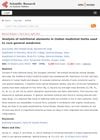Indian Kino Bark
Research
20 / 1000+ results
research Ethnodermatological Use of Medicinal Plants in India: From Ayurvedic Formulations to Clinical Perspectives – A Review
Indian herbal medicine shows promise for treating skin diseases but needs more research to prove effectiveness.

research Traditional Knowledge Digital Library: The Challenges Ahead
The document suggests creating a secure database for indigenous knowledge and recommends that the TKDL actively fight patents that slightly alter traditional knowledge.

research Bioactivity of the Geranium Genus: A Comprehensive Review
Geranium plants have healing properties like fighting microbes, protecting the liver, reducing inflammation, and may help with viruses, stomach issues, and diabetes.

research Concept of Hair Problems and Its Treatment in Ayurveda
Ayurveda treats hair problems like hair loss and dandruff by balancing body elements and using natural remedies like Indian Gooseberry and false Daisy.

research Aging and Anti-Aging in Hair and Hair Loss
Hair ages and thins due to factors like inflammation and stress, and treatments like antioxidants and hormones might improve hair health.

research Medical Treatment of Alopecia
The most effective treatments for hair loss are minoxidil, finasteride, PRP, and hair transplants, with steroids and immunosuppressants for autoimmune types.

research Novel Insights Into the Molecular Mechanisms Underlying Generalized Glucocorticoid Resistance and Hypersensitivity Syndromes
Genetic defects in the glucocorticoid receptor gene can cause conditions with abnormal sensitivity to stress hormones, and other factors may also affect this sensitivity.
research HIV Symptom Clusters Are Similar Using the Dimensions of Symptom Occurrence and Distress
HIV symptoms often occur together and cause similar distress.

research Genetic Defects of Female Sexual Differentiation
Genetic mutations can affect female sexual development, requiring personalized medical care.

research Hair Growth Promoting Effect of Dicerocaryum Senecioides Phytochemicals
Chemicals from the plant Dicerocaryum senecioides were found to safely speed up and increase hair growth in mice.
research An In Vivo Comparative Study of Sonic, Desert, and Indian Hedgehog Reveals That Hedgehog Pathway Activity Regulates Epidermal Stem Cell Homeostasis
Proper hedgehog signaling is crucial for maintaining healthy skin stem cells.
research Indian Medicinal Herbs And Formulations For Alzheimer’s Disease: From Traditional Knowledge To Scientific Assessment
Indian herbs like Bacopa monnieri and Centella asiatica may help memory, but more research is needed.

research Medicinal Plants with Traditional Use: Ethnobotany in the Indian Subcontinent
Indigenous herbal medicines in the Indian subcontinent have potential for drug development but need more research and standardization.

research Observation of Phenotypic Variation Among Indian Women With Polycystic Ovary Syndrome (PCOS) From Delhi and Srinagar
Indian women with PCOS from Delhi and Srinagar show different symptoms, with Delhi women having higher obesity and blood sugar issues, and Srinagar women showing more hair growth and testosterone levels.

research Indian Hedgehog Controls Proliferation and Differentiation in Skin Tumorigenesis and Protects Against Malignant Progression
Indian Hedgehog helps control skin cell growth and protects against aggressive skin cancer.

research A Study of Patterns of Androgenetic Alopecia in Men: An Indian Perspective
Indian men have 62.1% hair loss, mostly grade II vertex, and less extensive than other populations.

research Indian Gooseberry (Emblica Officinalis Gaertn.) Pharmacological Properties
Indian Gooseberry has potential for cancer prevention and treatment and promotes hair growth.

research Analysis of Nutritional Elements in Indian Medicinal Herbs Used to Cure General Weakness
Indian medicinal herbs used for general weakness contain beneficial nutrients.

research Comparative Evaluation of Sonographic Ovarian Morphology of Indian Women with Polycystic Ovary Syndrome Versus Normal Women
Indian women with PCOS may need different ultrasound criteria for diagnosis than current standards.

research Preparation and Evaluation of Hair Growth Formulations of Indian Ginseng (Withania Somnifera) for Alopecia
Indian Ginseng may help promote hair growth for treating alopecia.